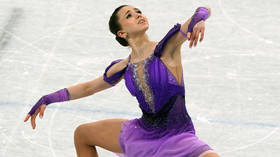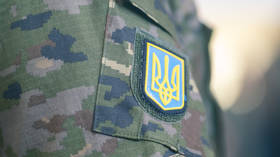The Russian figure skating sensation is at the center of an Olympic storm
Russian figure skating prodigy and Winter Olympics singles gold medalist favorite Kamila Valieva has tested positive for a banned drug.
The International Olympic Committee (IOC) initially postponed the medal ceremony for the team figure skating event on Tuesday over unspecified legal issues. Now the International Testing Agency (ITA) has revealed that the case concerns a test taken before the Games by Valieva.
Will Valieva be able to compete in the rest of the Games? What will happen to the medals due to be awarded for the team competition? Those are among the questions in this complex case – here’s the latest on what we know.
Why is Kamila Valieva at the center of an Olympic doping scandal?
The ITA announced on Friday that the figure skater tested positive for a banned heart drug on December 25 during the Russian Figure Skating Championships in St. Petersburg.
The sample was tested in a lab in Stockholm accredited by the World Anti-Doping Agency (WADA), which reported the positive result on February 8 – a day after Valieva played a starring role in Russia’s team event win.
Valieva returned an Adverse Analytical Finding for trimetazidine, which the ITA called a “non-specified prohibited substance” .
The 15-year-old did not have to be named because her age means she is deemed a ‘protected person’ by WADA.
The Russian Anti-Doping Agency (RUSADA) has also opened an investigation into Valieva’s entourage as part of its responsibilities towards minors involved in potential doping violations.
What is trimetazidine?
Trimetazidine has stimulant properties and is used to treat angina or chest pain caused by reduced blood flow to the heart.
WADA has listed trimetazidine as a metabolic modulator on its banned list since 2014, outlawing its usage by athletes in and out of competition.
Some have questioned how trimetazidine could be used to enhance performance. Speaking to RT, Yaroslav Ashikhmin, a member of the European Society of Cardiology and the American Heart Association, called the drug a “heart vitamin” and said it represented a “complete mess with doping control if this drug is identified as doping.”
Switzerland-based sports lawyer Lucien W. Valloni also called the presence of non-performance enhancing drugs on the banned list “problematic” and said it needs a major review.
In an advisory note in 2018, WADA said that trimetazidine could show in urine samples as a false positive for a permitted migraine medication.
If Kamila Valieva tested positive, why is she still training in Beijing?
Valieva was provisionally suspended by RUSADA on the day the result was reported by the lab.
The prodigy successfully appealed to reverse that decision with a disciplinary committee on February 9, freeing her to train and compete.
The women’s short skate in the single event does not take place until February 15, with the free skating event being held two days later.
In the meantime, Valieva trained in front of her team and the media at the Games on Friday.
Why has Kamila Valieva’s positive test only just been revealed?
That is a good question, and one that ROC president Stanislav Pozdnyakov wants to know the answer to.
Pozdnyakov has said there are “serious questions” around the sample, which he said should have a 20-day deadline to be returned. He also suggested that “someone” deliberately held the probe until after the team event.
Later on Friday, RUSADA said it had been informed by the Stockholm laboratory that Covid-related issues caused the delay in returning Valieva’s result.
Separately, the ROC said that Valieva has “repeatedly” passed doping tests since December 25.
The negative results included samples taken at the Games and at Valieva’s European Figure Skating Championships triumph in January.
What happens next in Kamila Valieva’s doping case at the Beijing Games?
The International Olympic Committee (IOC) and International Skating Union (ISU) are both challenging the ruling to lift Valieva’s suspension with the Court of Arbitration for Sport (CAS).
The CAS has set up temporary bases in Beijing to deal with urgent issues. It is set to hear the case before the ladies’ singles event.
WADA has announced that it will be filing its own appeal to the CAS because it believes its code has "not been correctly applied" in the decision to lift Valieva's provisional ban.
The hearing will reportedly take place in a ground-floor conference room at the Continental Grand Hotel in Beijing, which is near the Bird’s Nest stadium where the Games opening ceremony was held. Lawyers for all of the bodies involved will be present in person or by video link.
What happens to the ROC’s gold medal in the team figure skating event at the Olympics?
At the moment, we don’t know – although the ROC has said there will be no automatic investigation into the result because Valieva’s test took place outside of the Games.
If the ROC is stripped, Team USA would rise to the gold position, with Japan awarded silver and Canada taking bronze.
Valieva’s teammates, Mark Kondratiuk, Anastasia Mishina, Aleksandr Galliamov, Victoria Sinitsina and Nikita Katsalapov, are waiting to discover whether they will receive their gold medals.
Their victory was the ROC’s second gold medal of the Games following skier Alexander Bolshunov's triumph on Sunday.
What has the reaction to the Winter Olympics figure skating doping case been in Russia?
The ROC has emphasized its support for Valieva, asserted her right to compete and said it is willing to comply fully with the investigation.
Kremlin spokesman Dmitry Peskov urged support for Valieva, adding: “We say, ‘Kamila don’t hide your face. You are Russian. Walk proudly and, most importantly, compete and defeat everyone.’”
Legendary Russian figure skating coach Tatiana Tarasova has emphatically backed Valieva alongside a host of current and former competitors including two-time Olympic gold medalist Tatiana Volosozhar, who devised the supportive hashtag #willneverbelieveit.
The Russian figure skating federation has said it has "no doubt“ that Valieva is a clean athlete. Russian Sports Minister Oleg Matytsin demanded respect and an end to rumors around the youngster, adding that Russia is committed to the principles of “zero tolerance for any anti-doping rule violations”.
What has the reaction to Kamila Valieva’s Olympics doping situation been elsewhere?
The head of the US Anti Doping Agency (USADA) responded with predictably threatening rhetoric, warning that it could try to prosecute Russia under the American Rodchenkov Act.
The bill empowers American prosecutors to seek fines of up to $1 million and jail terms of up to 10 years for incidents affecting American athletes, including actions by non-American rivals.
Ex-WADA deputy head Rob Koehler blamed his former organization, the IOC and the CAS, saying that Russia’s current two-year ban from major sporting events, which means it appears under a neutral flag and banner, should have been implemented for four years.
Former WADA head David Howman said RUSADA should have pushed harder for results from the lab and said that WADA and the ISU were responsible for overseeing the timely collection and analysis of the sample.
The Canadian Olympic Committee called for a fair process in the case. “Our hope is that this is resolved quickly and the medallists get the medal moment they've earned here in Beijing,” it added.














